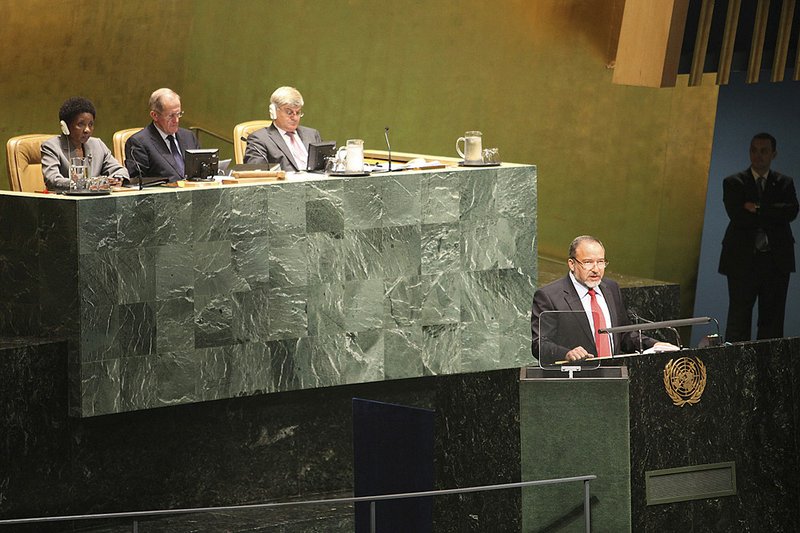UNITED NATIONS — Israel’s foreign minister called Tuesday for an intermediate agreement with the Palestinians, a position directly at odds with Prime Minister Benjamin Netanyahu, who is trying to reach a final peace deal in the coming year.
Speaking at the annual ministerial meeting of the U.N. General Assembly, Avigdor Lieberman also said the guiding principle in a final agreement must not be “land-for-peace” but an exchange of land “to better reflect demographic realities.”
He said the solution must be “two-staged” because the “emotional problems” between Israelis and Palestinians can’t be resolved until a new generation is raised that has mutual trust “and will not be influenced by incitement and extremist messages.”
“Under these conditions, we should focus on coming up with a long-term intermediate agreement, something that could take a few decades,” Lieberman said.
The prime minister’s office immediately distanced Netanyahu from Lieberman’s comments.
“The contents of the foreign minister’s speech at the U.N. were not coordinated with the prime minister,” it said. “Prime Minister Benjamin Netanyahu is the one heading the political negotiations on behalf of the state of Israel. The various subjects of the peace agreement will be discussed and set only around the negotiation table and not in any other place.”
During Lieberman’s speech, two Palestinian diplomats got up and walked out of the assembly chamber. The seats for Iran and Iraq were empty when shown on U.N. television.
Lieberman heads Yisrael Beitenu, an ultra nationalist party that is the second-largest member of the coalition government led by Netanyahu. He also is a West Bank settler.
Lieberman is not directly involved in the Mideast negotiations. In his speech, he alluded to the perception of differences in the government.
“I want to emphasize that contrary to what is often shown in the international media, the political arena in Israel is not divided between those who seek peace and those who seek war,” Lieberman said. “Everyone wants peace and the controversy in Israel centers on the specific question of how to achieve this peace, how to reach security and stability in the region.”
He spoke as U.S. envoy George Mitchell arrived in Israel on Tuesday in a last-minute push to close the gaps.
Mitchell was to meet early today with Israeli Defense Minister Ehud Barak, a political centrist who, with the West Bank under military rule, has sweeping powers to veto or approve settlement projects.
Interactive
Officials close to Barak have said he favors requiring any future settlement construction to receive his personal approval - a move that would in effect leave a building freeze in place.
Today and Thursday, Mitchell was to speak separately with Netanyahu and Palestinian President Mahmoud Abbas.
Israel’s decision to resume new West Bank settlement construction after a 10-month moratorium expired at midnight Sunday has angered Palestinians who threatened to abandon talks if building resumed. But Abbas said he wouldn’t make a decision until he consults senior Arab officials in Cairo next week, giving U.S. mediation a brief window to find a solution.
Meanwhile, Israeli naval forces seized a sailboat Tuesday carrying nine Jewish activists toward blockaded Gaza without meeting any resistance and then escorted it safely to shore, the military said.
The sailboat Irene was trying to breach Israel’s 3-year-old naval blockade of the Palestinian territory.
Information for this article was contributed by Karin Laub, Mohammed Daraghmeh, Ibrahim Barzak, Aisha Mohammed, Diaa Hadid, Ben Hubbard and Frank Jordans and Amy Teibel of The Associated Press.
Front Section, Pages 6 on 09/29/2010
